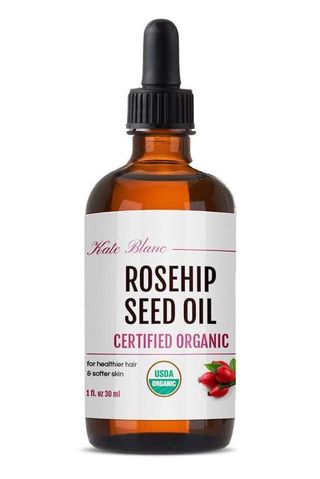You may have seen the latest trend in skincare: rosehip oil. It’s not a new product since it has been around for centuries and used by many cultures, but it is now becoming popular with people looking for natural solutions to their skin problems.
Rosehip oil is from the seeds of roses and has a high concentration of Vitamin A, which helps promote healthy skin cells. It also contains other vitamins such as C and E and essential fatty acids that help heal scars, wrinkles, stretch marks, and sun damage.
Some people use rosehip oil as their moisturizer because it penetrates deeper into the skin than other products. Is this an effective strategy? Read on to find out.
Does Rosehip Oil Go Before or After Moisturizer?
Rosehip oil goes after moisturizer. You should not apply the oil before applying moisturizer as it will make your makeup routine longer. Its healing effects are wonderful for scars, fine lines, and wrinkles. The product is not ideal if you have acne-prone skin as it can cause breakouts.

How Does It Work?
Here is how it works:
1. It Absorbs into the Skin
Rosehip oil absorbs quickly, which is why some people prefer it as a moisturizer. It also leaves no greasy residue behind and won’t clog pores. While you may not want to use rosehip oil without additional products because of its strong smell, this type of product does have many benefits on its own.
2. Penetrates Deeper
The oil is excellent for moisturizing the skin because it penetrates deep into the layers to restore hydration and elasticity. It means that you can use rosehip oil on its own or add a few drops to your regular moisturizer without any fear of them canceling each other out. It will help keep your skin healthy and hydrated.
4. It’s Natural
Rosehip oil is all-natural, which means that you don’t have to worry about it breaking you out or irritating your skin. If you are looking for a way to treat scars, wrinkles, and stretch marks – the product may be the answer. Since rosehip oil comes from natural sources, there are no additives like you would find in regular moisturizers.
5. Too Much Sun
Remember, rosehip oil doesn’t have any sun protection properties. For that reason, we recommend that you use a moisturizer with SPF in the morning and apply your rosehip oil after about six hours or when you get home from work. That will ensure that your skin stays hydrated all day long.
Applying Rosehip Oil
Rosehip oil is not greasy so that it won’t clog your pores. However, you should be careful to use just a few drops because it can leave your skin feeling oily and shiny, which isn’t the look most people desire. Using the oil at night before bed may work best because you have time to let it soak in before applying your makeup.
Who Should Use It
It is ideal for people with dry skin, but it can also benefit people with oily or combination skin types. It may not work well if you have acne-prone skin because rosehip oil is high in linoleic acid, which causes breakouts in some cases. However, many other oils contain a similar fatty acid profile that you could use instead.
Who Shouldn’t Use It
If you have acne-prone skin and want to use rosehip oil, you should test it out first on a small patch of your skin. If you don’t experience any breakouts after two days, the product is likely safe for you to use regularly. However, if you notice some irritation or more frequent breakouts in places where you applied the oil, you should discontinue using it and try another product.
Pros of Using It
1. Healing Effects
Rosehip oil has vitamin A and has been helping people with scars to heal, reduce fine lines and wrinkles, and stretch marks. It also helps prevent sun damage which makes it a great anti-aging product. The fatty acids found in rosehip oil are essential for promoting healthy skin cells because they can penetrate deep into the layers of your skin.
2. Good for All Skin Types
Rosehip oil is great for dry, combination, or oily skin. It doesn’t leave behind a greasy residue, and it won’t clog your pores. That makes it an excellent product to add to your beauty routine if you don’t want to go through the trouble of mixing multiple products.
It is also ideal for people with sensitive skin because it is high in linoleic acid, which has anti-inflammatory properties.
3. Doesn’t Feel Heavy
Since rosehip oil does not contain any sunscreen agents, it won’t cause breakouts even if you use it daily. If you have acne-prone skin and want to add a moisturizer with an SPF rating of 30 or higher to your daily routine, it would be advisable to use the Neutrogena Ultra Sheer Dry-Touch Sunscreen with an SPF of 55.
4. Affordable
You can find rosehip oil at your local grocery store for around $20, which is more affordable than most skincare products. Since the product comes with many benefits, you don’t have to worry about purchasing multiple items. A few drops of the oil will go a long way, and you should only need three or four drops to cover your face and neck.
5. Easy to Use
When you purchase rosehip oil, it should come in a dropper bottle which makes it easy to dispense. If your product does not include one of these bottles, transfer the oil into an empty eye drop or contact lens solution container so that you can control how much product comes out at a time.
Cons of Using It
Can Cause Breakouts in Sensitive Skin Types
Although rosehip oil is great for acne-prone skin because it has an anti-inflammatory effect, it may not be suitable if you have oily or combination skin that breaks out easily. That’s because there are some ingredients in rosehip oil like oleic acid and linoleic acid that can cause breakouts if you’re not careful.
Requires Time to Soak into the Skin
If you apply rosehip oil before applying your makeup, it will make the process of getting ready take longer because you’ll need to wait for the product to t absorb into your skin.
